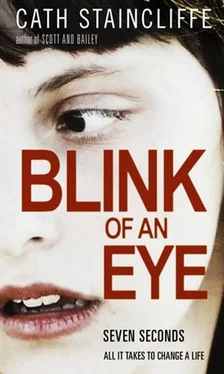Carmel
Naomi stayed awake longer the next time we visited. Her voice still had that awful rasp and she didn’t say much. But she did ask us about the accident. I felt a shrivelling sensation, but I knew I had to tell her. ‘It was after the barbecue,’ I said.
She didn’t show any glimmer of recognition.
‘You and Alex, a car crash.’
A flicker of alarm. ‘But…’ she said, then, ‘Alex?’
‘He’s fine,’ Phil said, ‘couple of broken bones but-’
‘Oh God!’ She made a retching movement. I reached to fetch the cardboard bowl from beside the bed in case she was sick, but she didn’t repeat the motion.
‘A crash,’ she said slowly. It was as if she couldn’t understand what we were saying.
‘On Mottram Lane,’ I said, thinking that pinpointing the location might help her.
She gave a little quick breath in and out, then said in a panicky voice, ‘I can’t remember. I don’t remember,’ louder, frightened.
‘Don’t worry,’ I said. ‘You banged your head, banged everything. It might take a bit of time.’
‘You remember the barbecue?’ Phil said.
Naomi’s eyes flicked from side to side. A trapped animal.
‘At Suzanne’s,’ he said.
She shook her head. ‘Why can’t I remember?’
I took her hand. ‘You’ve had concussion.’ I didn’t know how much to tell her: you died at the scene, they revived you there . ‘It’s amnesia because of the trauma.’ I tried to sound calm.
‘But it’ll get better?’ she said. ‘It’ll come back?’
‘Probably,’ I said. ‘We’ll ask.’ I nodded towards the nurses’ station. I wondered how much time she had lost: days, weeks, years? She knew us, knew Alex, so the amnesia couldn’t be that extensive.
She began to whimper again in pain; the dose of medicine they gave her acted quickly, and she soon became drowsy then slept.
The staff were brilliant but refused to give any prognosis regarding memory loss. Patients varied widely, the nurse said. The majority regained memory; for some it was gradual and could take weeks, while others recalled everything in one flash of illumination. A minority never recovered from the amnesia precipitated by the trauma. There were theories that it was the brain’s way of protecting them; the memories could be too harrowing to countenance. I didn’t say anything to Phil, but I knew Naomi’s memory might never return. A woman we were called out to, who’d survived a stabbing by her husband, was similarly unable to recall the attack itself or the immediate aftermath. The body is wise sometimes. After all, how grotesque would it be to have total recall of something like that haunting you day in and day out?
We argued about when to tell Naomi the full truth about the accident: that a little girl had died. ‘If she can’t remember, then maybe her brain’s doing that on purpose, waiting until she’s built up some resilience,’ I said.
‘Or maybe this is as good as it gets,’ Phil said.
‘She hasn’t asked for any details,’ I said. ‘She’s not stayed awake long enough, she’s not ready yet.’
‘But the longer we leave it, the bigger a shock it’ll be. We’ve always been honest with the kids, Carmel.’
‘I know, but she died, Phil, she… It’s too soon. Look, let’s ask the consultant, ask to see him and get his advice. If he thinks the timing’s immaterial then we’ll tell her everything.’
‘Okay,’ he agreed.
‘I told her it’ll be all right,’ I said, feeling my eyes prickle, ‘but it won’t be, will it?’ Even if she remembered everything, even if she healed completely, there was a little girl dead and the emotional burden that would lay on Naomi for the rest of her days.
He held me and comforted me. ‘She’s alive,’ he said finally, sounding gruff.
‘For now that’s all that counts. Yeah?’
The consultant, Mr Hakim, in effect told us to make up our own minds. He had no guidance as to what would be medically preferable. He’d given the go-ahead for her to eat and drink again, and she would soon be moved to a general surgical ward and assessed by physio and rehab, who would help plan her discharge. If all went well we’d be looking at weeks not months.
I was still reluctant to bite the bullet. Hoping that tomorrow or the next day it would all come flooding back to her and then we would do our best to help her to come to terms with what had happened. I just wanted her to be more robust, physically stronger to bear the impact of it.
Suzanne agreed with her father, ‘The sooner Naomi knows the truth, the better.’ I wouldn’t have expected her to say otherwise. Suzanne never puts anything off. There’s a bravery in that perhaps, a willingness to act immediately, to put a decision into practice as soon as it is born, but in this case I also felt there was a twinge of self-righteousness, a desire to punish Naomi for what she had done. Then I felt dirty for apportioning such motives to Suzanne, for seeing perverse intent when possibly she simply thought nothing could be gained by prevaricating. In my efforts to protect Naomi, I was thinking badly of her sister. As though they were either side of a see-saw and the only way one could rise was at the expense of the other.
‘A compromise,’ I suggested to Phil, after we’d asked Suzanne to honour our wishes and not give Naomi any details before we did.
I was putting things in a bag for her: nightdress and dressing gown, knickers, toothbrush and paste, socks and shampoo and conditioner. She hadn’t had a shower yet, but when she did, I thought she’d like some of her own things.
‘Once she’s out of intensive care, we’ll tell her then.’
‘And if she asks before?’ he said.
‘Yes.’ I put her hairbrush in and zipped up the bag. The room was messy, left just as it had been when Alex and Naomi had set off for the barbecue. Outfits on the bed that she must have been trying on, plates and cups on the chest of drawers. Alex’s jeans on the chair and discarded socks and trainers nearby.
My phone interrupted us. It was Evie. She was pleased to hear Naomi was awake and out of danger, sent her love, checked if there was anything she could help with, then spoke to me about work. ‘The thing you wanted me to check. It’s the Cottesloe hearing, Wednesday the sixth.’
‘Oh shit! I can’t miss that.’
‘You’ll be in bits.’
‘What time is it?’
‘Eleven.’
‘I’ll do it. It’ll be a right mess if someone else has to cover. I can’t not go.’
Ivy Cottesloe had been a pensioner, recovering from a stroke, supposedly looked after by her daughter and son-in-law, who had submitted her to terrible neglect and inhumane treatment. She was tied to her bed (the couple claimed this was to prevent her falling out) and starved. The couple withdrew her pension and savings and kept GPs, the pharmacist, neighbours and old friends at bay with a mishmash of lies and evasions: Ivy’s in hospital again; she’s at her sister’s; she’s too ill to come to the phone but I’ll tell her you called .
Her sister did eventually visit in person, travelling from Jersey, and when she was turned away it only served to confirm her suspicions that something was amiss. She spoke to the local police, who made a referral to the social work out-of-hours team. It was a Saturday afternoon. When my colleague and I arrived at the house, Ivy’s daughter told us she had moved. But she grew increasingly aggressive as we asked for more information, and it was obvious she was hiding something. When it became clear that we were not leaving until we had seen round the house – and that we were more than happy to involve the police if she prevented us – she began to backtrack: Ivy was demented, she had been refusing to eat, she wouldn’t use the commode, she was violent, we had no idea what it was like.
Читать дальше












